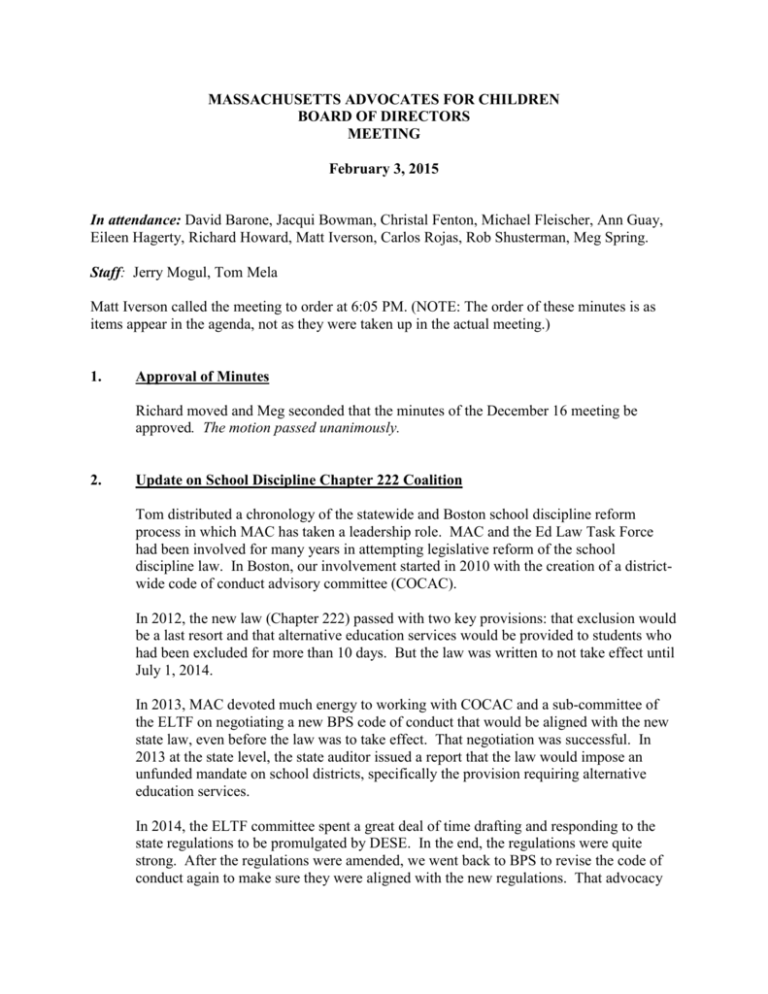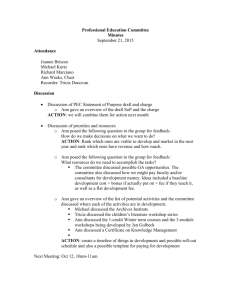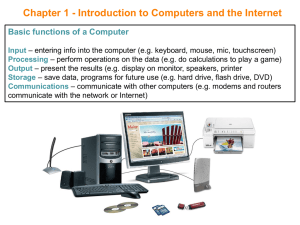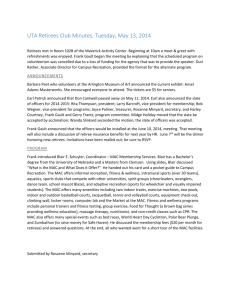Bn attendance: Dalia, Kelley, Eileen, Ruth Ann, Faith, Jacquelynne
advertisement

MASSACHUSETTS ADVOCATES FOR CHILDREN BOARD OF DIRECTORS MEETING February 3, 2015 In attendance: David Barone, Jacqui Bowman, Christal Fenton, Michael Fleischer, Ann Guay, Eileen Hagerty, Richard Howard, Matt Iverson, Carlos Rojas, Rob Shusterman, Meg Spring. Staff: Jerry Mogul, Tom Mela Matt Iverson called the meeting to order at 6:05 PM. (NOTE: The order of these minutes is as items appear in the agenda, not as they were taken up in the actual meeting.) 1. Approval of Minutes Richard moved and Meg seconded that the minutes of the December 16 meeting be approved. The motion passed unanimously. 2. Update on School Discipline Chapter 222 Coalition Tom distributed a chronology of the statewide and Boston school discipline reform process in which MAC has taken a leadership role. MAC and the Ed Law Task Force had been involved for many years in attempting legislative reform of the school discipline law. In Boston, our involvement started in 2010 with the creation of a districtwide code of conduct advisory committee (COCAC). In 2012, the new law (Chapter 222) passed with two key provisions: that exclusion would be a last resort and that alternative education services would be provided to students who had been excluded for more than 10 days. But the law was written to not take effect until July 1, 2014. In 2013, MAC devoted much energy to working with COCAC and a sub-committee of the ELTF on negotiating a new BPS code of conduct that would be aligned with the new state law, even before the law was to take effect. That negotiation was successful. In 2013 at the state level, the state auditor issued a report that the law would impose an unfunded mandate on school districts, specifically the provision requiring alternative education services. In 2014, the ELTF committee spent a great deal of time drafting and responding to the state regulations to be promulgated by DESE. In the end, the regulations were quite strong. After the regulations were amended, we went back to BPS to revise the code of conduct again to make sure they were aligned with the new regulations. That advocacy February 2015 Minutes process was also successful. Finally, last year the legislature increased the amount of funding in the alternative education line item from $146,000 to $246,000. To date, no school district has sued because of the unfunded mandate ruling by the state auditor. This year, the committee continues to be very active and strong. The number of people involved with ELTF has actually increased. There are three work groups: school discipline in charter schools; outreach and training (for schools to learn about alternatives to exclusion); and litigation, to be prepared to respond to districts that refuse to align with the new law. We are also in the process of responding to a new DESE guidance and advisory. At the city level, COCAC has proposed to BPS that it work with the students from BSAC in certain high schools to train school site councils which have the authority in the school around disciplinary procedures. In the meantime, Tom and other members of the ELTF continue to take school discipline cases as a window to how schools are being responsive or not to the new law. During the question period, Tom responded to Richard that DESE does have a monitoring role to review, report and intervene with outlier districts, based on numbers of suspensions, especially around disproportionality for students of color and students with disabilities. Additionally, the law includes a number of provisions to strengthen the due process rights of the student. Ann asked whether METCO students are included, to which Tom answered yes, and all public schools, but not private special education schools. MAC is currently looking into how school discipline takes place in these schools. Tom also noted that schools have to take all reasonable steps to involve parents. 3. Project Update Highlights Jerry highlighted the following items from the Project Update: o Boston School Reform is continuing to advocate for a new School Committee-level task force addressing the achievement gap, particularly to address recent reports of the persistent gap affecting Black and Latino male students. We have joined the “Change Circle,” a new group organized by Hubie Jones to systematically address these concerns from a community perspective, as a complement to the BPS task force and to the mayor’s “My Brother’s Keeper” initiative. MAC is also using our involvement and expertise in this issue to position ourselves to possibly reframe our Boston School Reform proposal to the Barr Foundation, which, due to the uncertainty of still being without a grant manager in its education priority area, has told us that the next grant we get starting in April 2015 should be considered an “exit” grant. Repositioning our work in this area to focus on the achievement gap for students of color in Boston would also align us with the new strategic planning direction of the Hyams Foundation. Ann asked about whether the needs of girls are being excluded, and Jerry responded that they not but given the data, the emphasis has been on males. She also noted that another population at risk is students who are homeless. o TLPI is playing a lead role in the Safe and Supportive Schools Commission, which has held its first meeting. 2 February 2015 Minutes o MAC’s workforce development task force has involved over 60 organizations from the education, disability and workforce sectors, including state agencies, businesses, funders, schools and providers. We are working now to develop a set of recommendations by the end of March for all the stakeholders to adopt. Ann suggested involving Autism Speaks in the task force, as they have a major initiative around employment for young adults. o MAC has worked with key legislative sponsors to file priority bills, including one to increase rates for special education independent evaluations, authored by Bill Crane in our office. We will send fact sheets of the three priority bills to the board when they are available. o Grant update: a) We received a new Boston Foundation grant of $25,000 to continue the Boston Special Education Transition (B-SET) project. However, the grant was considerably less than the previous grant of $160,000 over two years; b) We received a $40,000 grant from the Butler Foundation to match a gift from the Elhauge family for MAC to hire a Spanish-speaking attorney so that we could increase our capacity to represent Latino families and their children with autism and other disabilities. o The team from the Harvard Business School’s Community Action Partners has been reviewing our Helpline and interviewing staff and clients. Now they are starting to interview advocates and attorneys, as well as sister agencies that have similar helpline and pro bono advocacy services. o TLPI has contracted with a renowned research organization, American Institutes of Research (AIR), to develop an evaluation plan that will allow us to assess the effectiveness of our model for schools to become trauma-sensitive. We will work with them to find funding to actually conduct the evaluation. 4. Review of Survey Results from MLAC Peer Review Matt focused on the lowest score in the Board survey: 3.9 for board development. Discussion centered on whether MAC provides sufficient information or orientation to new members, whether a manual or packet is provided, and whether that is sufficient. Meg notes that it is required for all board members to receive the by-laws of the organization. Eileen, who chairs the board development committee, stated that her committee should take up this issue of how best to engage new board members. Ann suggested a mentor model for new board members. Jacqui noted that the timing of the survey was such that we hadn’t yet implemented this new committee meeting structure, which is intended to engage members more actively in the board and organization. Richard agreed that the PPP committee will look into the results of the staff survey. Jerry noted that the report of the peer reviewers is coming very soon. It was agreed that after he reviews, he will send to the executive committee and the PPP committee for further review. 3 February 2015 Minutes 5. Committee Reports a) Finance Rob reviewed the 2014 budget which shows a projected surplus of about $39,000, which excludes $33,000 in revenue for which we are able to defer recognition until 2015 for a variety of reasons that meet accounting guidelines, according to Jerry who vetted these deferrals with our auditor. As our financial consultant was not able to come to the office to officially close the books for the year because the snowstorms of the past week, the budget is the best that Jerry could come up with given the information he had. He does not anticipate any surprises, and so the final results should be close. Rob reported that he compared this budget with the one the board approved in February, and the revenue was remarkably close, with a variance of .5%. The expenses were lower, mainly because of loss of staff. The 2015 budget projects a small surplus of $2,600, which includes probable expenses that would be eliminated if we did not get the revenue to cover those costs. Revenue and expenses are increased compared to 2014, with a higher projected goal for our special event, which Rob expressed concerns about. The budget includes a new $100,000 grant from Jane’s Trust and a full step increase for eligible staff, worth probably about $20,000. It builds in two new attorneys to replace recent departures and funds for a communication consultant. Health insurance costs are actually decreasing. Rob moved and Meg seconded that the board approve the 2015 budget. The motion passed unanimously. b) Development Ann reported on the development committee meeting that was held just before the board meeting. Carol Savage, MAC’s development director, distributed a draft development plan that takes into account the departure in a few weeks of Dan Perlman and the need to replace his communications responsibilities. Another aspect of the plan is to identify 15 strong prospects for significant donations. The committee will brainstorm names at then next committee meeting and then Carol will come to the next board meeting in June to go through the same process. In part to have materials to share with donor prospects, Carol is also planning to produce an Annual Report which will be available on line and downloadable from a PDF. 6. Board and Committee Tasks and Scheduling for 2015 Matt asked each committee chair to report on plans for meetings over the next four months prior to the June meeting. Ann reported that the Development Committee just met and will have two meetings prior to the board meeting at which time Carol will be presenting. Jacqui reported that the Personnel Committee’s main task will be to review staff pay comparability with other legal aid organizations. They plan to meet three times- to discuss new hires, to review the pay scale and to meet with the Finance Committee. 4 February 2015 Minutes The Board Development Committee will meet to discuss methods to assess the performance of the board, the best way to orient new board members and to vet nominees to the board for the next term. Richard reported that he would like to convene the first meeting of the PPP in person and is hoping that March 9 will be a good meeting date. Matt and Carlos agreed that they are available. Jerry will send out a notice to see if other members are available. He will also send out the latest document from the Harvard Business School team developing strategies to help us increase our pro bono capacity. Jacqui moved and Ann seconded that the board meeting adjourn at 7:50 PM. These Minutes were approved by the MAC Board of Directors on June 9, 2015. ____________________________ Jacquelynne Bowman, Clerk 5





